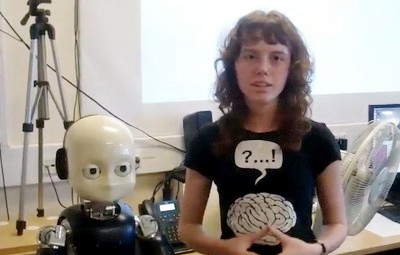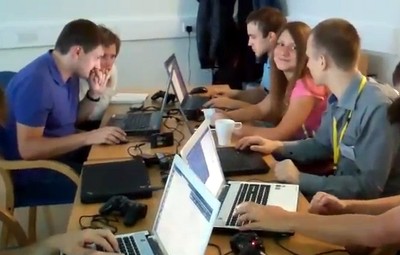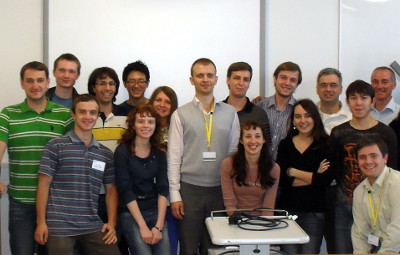Human-Centred Robotics
The Human-Centred Robotics course runs every autumn in the Department of Electrical Engineering and is open to fourth years students (master level) in Electrical and Electronic Engineering, Electronic and Information Engineering and Bioengineering. Our objective to teach the theory and design of robotic systems capable of intelligent interaction with humans, and their application in industrial, medical and rehabilitation settings.
The course is firmly anchored in our philosophy of learning by doing, and consequently the assessment is fully based on coursework. Students work in groups of 4 to 8 people (there are around 4 or 5 groups each year) and are expected to develop both the hardware and software of a working robotic system applying the concepts explained in the lectures. There are around four or five projects a year, with the aims of each project being decided by students early in the course. We deliberately make the resources of our lab available for students with the aim of maximising the synergy between our research and the course projects.
The course is consistently ranked as one of the highest student satisfaction courses in the Electrical Engineering department. Further, we encourage our students to produce state-of-the-art projects which have resulted in publications in the past (eg. Sarabia et al. (2013) iCharibot: Design and Field Trials of a Fundraising Robot, ICSR).
"… probably the best coursework for the whole degree; demonstrated that coursework can actually be engineering."
(Anonymous student through online evaluation, 2011)
Human-Centred Robotics Projects Showcase
Here are some examples of the projects our students carried out as part of their Human-Centred Robotics course.

ROBERt
The Recycling-Of-Bottles Encouragement Robot was one of the first batch of projects in the course.
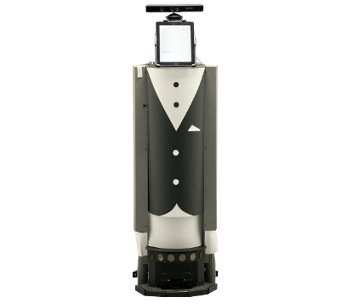
Rutler
Endowed with an elegant appearance and animated faces this robotic receptionist was in charge of guiding bypassers around the EEE department.

iCharibot
The Imperial Charity Robot was used to collect funds for charity. During field-trials £75.94 were raised for Cancer Research UK.
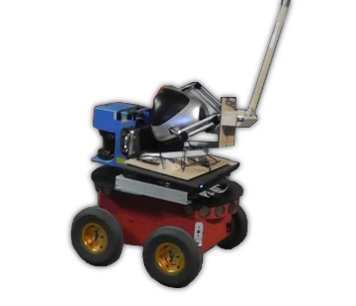
Robot Guide
The Robot Guide used audio cues, a vibrating belt and a haptic cane to ensure visually impaired people can navigate in large and dynamic environments.
Mobile Healthcare and Machine Learning
In January 2017, we will offer our new advanced module on Mobile Healthcare and Machine Learning (MHML) to senior students of the Masters of Engineering (MEng) course at the department of Electrical and Electronic Engineering for the second time.
The aim of the MHML module is to introduce advanced engineering students to the interdisciplinary challenges underlying the design and implementation of personalised mobile healthcare systems. Students will learn the theory and practice underlying mobile healthcare systems that:
- Perceive human states using multimodal interfaces including wearable sensors, portable patient monitoring devices, and mobile phones.
- Utilise mobile and cloud hardware, software and communication infrastructures to collect and securely store short- and long-term multimodal data.
- Use machine learning algorithms for visualisation and aggregation of data.
- Interact and maintain long-term engagement with users through mobile and web systems.
- Support education, self-management of chronic illnesses, behavioural change and treatment, and self-efficacy.
The course is heavily focused on realistic project work where groups of students will design, implement and evaluate mobile healthcare systems in realistic scenarios.
Skolkovo–Imperial Robotics Summer School
For 5 days during the summer of 2012, the Personal Robotics Lab hosted the Skolkovo–Imperial Robotics Summer School. 28 master, PhD and higher level participants coming from Moscow, Saint Petersbourgh and Tomsk joined us for an overview of the field of robotics. Co-organised with the Skolkovo Open University and Imperial Consultants, the Summer School covered both the theoretical underpinnings of robotics as well as hands-on laboratories and drew from our experience teaching the Human-Centred Robotics course.
The morning lectures were taught by the director of our Lab, Dr Yiannis Demiris, along with Prof. Alessandro Astolfi, who specialises in Control Theory, and spanned topics such as: Kinematics, Control, Planning, Localisation, Human-Robot Interaction, Assistive Robotics, Machine Learning and many others.


The practical afernoon sessions, led by the Lab member's Harold Soh, KyuHwa Lee and Miguel Sarabia, included the basics of ROS, OpenCV and RGB-D sensors as well as three case studies: Shared Control in Assistive Robotic Wheelchairs, Learning by Imitation and Dancing Robots.

